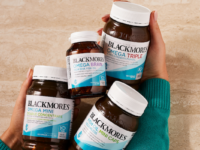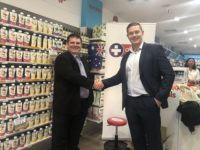 Bryan Loo started his first business at age seven, renting out self-made comic books to his classmates.
Bryan Loo started his first business at age seven, renting out self-made comic books to his classmates.
As an early-starting entrepreneur, it is not surprising that 24 years later he is MD of Chatime Malaysia, the bubbletea brand, and CEO of Loob, a holding company that manages a diverse range of F&B brands.
Five years after opening its first flagship outlet at Pavilion KL shopping mall, Chatime Malaysia now has 198 outlets – 85 per cent owned and run by Loo. Over at Loob, he oversees a growing range of F&B brands in Malaysia, including Chatime, Croissant Taiyaki, Gindaco, Hacha Mecha, Ikki, llaollao frozen yoghurt, Soda Xpress and Tino’s Pizza.
“The group vision is very simple,” Loo tells Inside FMCG during a trip to Melbourne. “We believe food has a lot to do with people’s future. As much as we think that technology is disruptive … people still have to eat.
“We want to create a multi-label F&B organisation that is really well-known in the Southeast Asia market – not just representing people and brands, but creating our own brands when we have the opportunity.”
Need to fit
He says the company does not just take on any brand. Brands need to fit the mould and niche the company has carved in the market. “There are a couple of things we do so right, so we want to occupy that space. Our brands need to be fast-moving products, automated and small format – these things hold strong in our business,” Loo says.
“Fine-dining restaurants and casual dining, that is not our game. If it needs a chef, not our game. Heavy cooking and oily food, not our game. We are occupying a space we think we can command well, and eventually, when global brands want to enter Southeast Asia, they will come to us first.”
Loo was in Australia seeking brands to take back to Malaysia. His particular focus is on the fast gourmet segment. He believes fast casual is slowing making its way to the Southeast Asian market.
“The fast-food segment has been totally disrupted by fast gourmet or fast casual,” he says. “People are not only demanding that food be served more quickly, it also needs to be gourmet. I think there are a lot of brands in the fast-casual space in Australia that have huge potential in Southeast Asia.”
Transformed himself
Loo was not always on track to carve out a career in the F&B industry. After failing to gain the grades needed to complete higher education in Malaysia, he moved to Monash University in Melbourne to study for a Bachelor of Science degree, majoring in biotechnology.
“Melbourne is a place very close to my heart. It’s where I saw a change and started to transform.”
After graduating with second-class honours, he returned to Malaysia and became an account executive with biotech company StemLife for two years before realising he wanted to go into business for himself.
“I said to my dad, ‘I really don’t know what I want to do in life – I know I just want to do business’,” he says. After travelling for four months trying to figure out what he wanted to do, he came to realise he wanted to go into F&B.
“It was the only industry I could convince myself would last through any market situation. It doesn’t matter if the market is soft, or if there is market depression, people still have to eat and drink.”
Pinpointed gap
It did not take long for Loo to pinpoint a clear gap in the Malaysian market – the modern tea-drinking culture. On a trip to Taiwan he realised the extent of the opportunity. After taking to the streets to find out what tea people were drinking, he was surprised to find 198 different brands on the market.
“Why would this culture not exist in Malaysia?” he asked himself. So he called his father and said he “I need to do this, and I have to do it now”.
After many rejections from leading brands, Loo ended up contacting Chatime. It was only a small company then, but it had one clear objective that resonated well with Loo: to expand anywhere else in the world but China.
“When you look at it, all 198 tea brands wanted to go to China. So where is the blue ocean? It’s everywhere else but China.”
Lot of effort
Fast-forward to 2010, and Loo opened his first Chatime store in Malaysia’s No. 1 shopping mall Pavilion. But that did not happen overnight nor without challenges.
People had negative perceptions about bubble tea, so it took a lot of effort to convince mall owners the product would appeal to consumers. After many rejections, he developed a good leasing proposal and sent it out to all the shopping malls throughout Malaysia.
It was nine months later – after 46 competing brands had flooded the market – that the malls started calling to offer him retail space.
“We expanded to 45 outlets in one year and really started pulling away from the competition. Today, only three brands have survived. The other two have only about 15 outlets, while we have 198, so that is a big difference.”
Today the company employs about 1100 people, and Loo still has the 15 childhood friends he started the business with sitting in key positions.
He credits a large part of his success to his mentor, his father, who originally lent him 300,000 ringgit (A$95,000) to start his first store.
“It doesn’t really matter how visionary you may be, if you do not have the people who are willing to believe in you and get their hands dirty, you are just a dreamer – especially in F&B,” says Loo.
This article first appeared int he October edition of Inside FMCG. Subscribe now.















